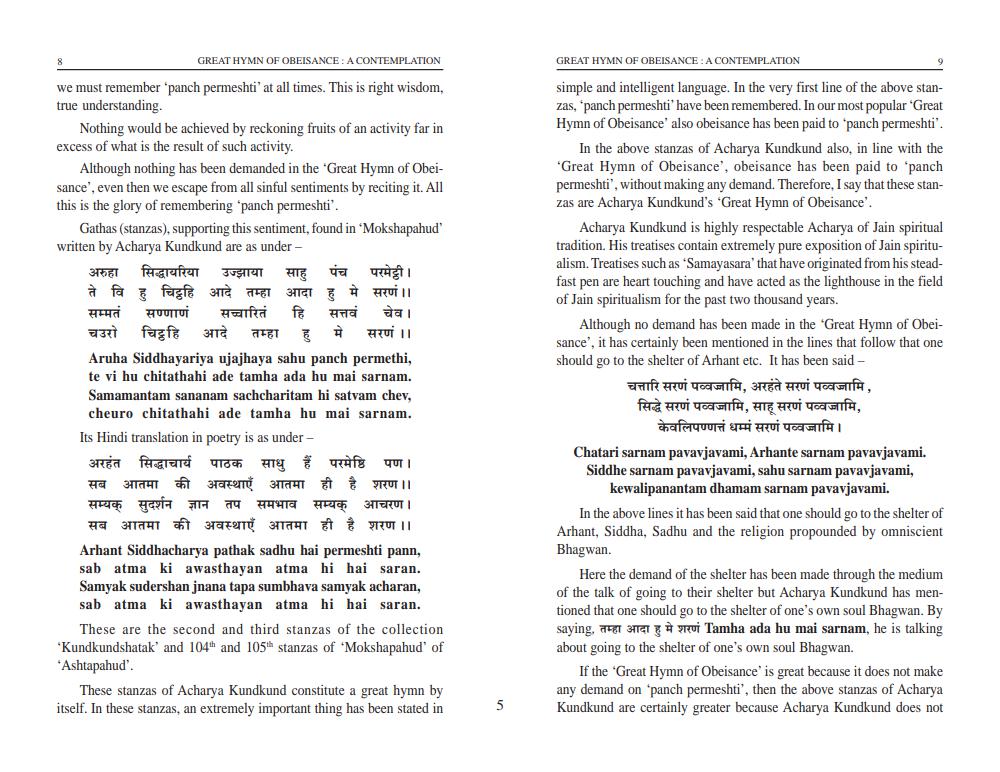Book Title: Namokar Mahamantra Ek Anushilan Author(s): Hukamchand Bharilla Publisher: Todarmal Granthamala Jaipur View full book textPage 6
________________ GREAT HYMN OF OBEISANCE: A CONTEMPLATION GREAT HYMN OF OBEISANCE: A CONTEMPLATION we must remember panch permeshti' at all times. This is right wisdom, true understanding. Nothing would be achieved by reckoning fruits of an activity far in excess of what is the result of such activity. Although nothing has been demanded in the Great Hymn of Obeisance', even then we escape from all sinful sentiments by reciting it. All this is the glory of remembering 'panch permeshti'. Gathas (stanzas), supporting this sentiment, found in Mokshapahudi written by Acharya Kundkund are as under अरुहा सिद्धायरिया उज्झाया साहु पंच परमेट्ठी। ते वि हु चिट्ठहि आदे तम्हा आदा हु मे सरणं ।। सम्मतं सण्णाणं सच्चारितं हि सत्तवं चेव । चउरो चिट्ठहि आदे तम्हा हु मे सरणं ।। Aruha Siddhayariya ujajhaya sahu panch permethi, te vi hu chitathahi ade tamha ada hu mai sarnam. Samamantam sananam sachcharitam hi satvam chev, cheuro chitathahi ade tamha hu mai sarnam. Its Hindi translation in poetry is as under अरहंत सिद्धाचार्य पाठक साधु हैं परमेष्ठि पण । सब आतमा की अवस्थाएँ आतमा ही है शरण ।। सम्यक् सुदर्शन ज्ञान तप समभाव सम्यक् आचरण । सब आतमा की अवस्थाएँ आतमा ही है शरण ।। Arhant Siddhacharya pathak sadhu hai permeshti pann, sab atma ki awasthayan atma hi hai saran. Samyak sudershan jnana tapa sumbhava samyak acharan, sab atma ki awasthayan atma hi hai saran. These are the second and third stanzas of the collection Kundkundshatak' and 1044 and 105th stanzas of 'Mokshapahud' of *Ashtapahud'. These stanzas of Acharya Kundkund constitute a great hymn by itself. In these stanzas, an extremely important thing has been stated in simple and intelligent language. In the very first line of the above stanzas, "panch permeshti' have been remembered. In our most popular 'Great Hymn of Obeisance' also obeisance has been paid to "panch permeshti'. In the above stanzas of Acharya Kundkund also, in line with the "Great Hymn of Obeisance', obeisance has been paid to 'panch permeshti', without making any demand. Therefore, I say that these stanzas are Acharya Kundkund's 'Great Hymn of Obeisance' Acharya Kundkund is highly respectable Acharya of Jain spiritual tradition. His treatises contain extremely pure exposition of Jain spiritualism. Treatises such as Samayasara' that have originated from his steadfast pen are heart touching and have acted as the lighthouse in the field of Jain spiritualism for the past two thousand years. Although no demand has been made in the Great Hymn of Obeisance', it has certainly been mentioned in the lines that follow that one should go to the shelter of Arhant etc. It has been said - चत्तारि सरणं पव्वजामि, अरहंते सरणं पव्वजामि , सिद्धे सरणं पव्वज्जामि, साहू सरणं पव्वजामि, केवलिपण्णत्तं धम्म सरणं पव्वजामि । Chatari sarnam pavavjavami, Arhante sarnam pavavjavami. Siddhe sarnam pavavjavami, sahu sarnam pavavjavami, kewalipanantam dhamam sarnam pavavjavami. In the above lines it has been said that one should go to the shelter of Arhant, Siddha, Sadhu and the religion propounded by omniscient Bhagwan. Here the demand of the shelter has been made through the medium of the talk of going to their shelter but Acharya Kundkund has mentioned that one should go to the shelter of one's own soul Bhagwan. By saying, FETITÀ Rui Tamha ada hu mai sarnam, he is talking about going to the shelter of one's own soul Bhagwan. If the Great Hymn of Obeisance is great because it does not make any demand on 'panch permeshti', then the above stanzas of Acharya Kundkund are certainly greater because Acharya Kundkund does not 5Page Navigation
1 ... 4 5 6 7 8 9 10 11 12 13 14 15 16 17 18 19 20 21 22 23 24 25 26 27 28 29 30 31 32 33 34 35 36 37 38 39 40 41 42 43 44 45 46 47 48 49 50 51 52 53
